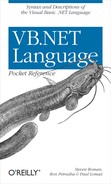Name
Sub Statement
Synopsis
[ClassBehavior] [AccessModifier] Subname[(arglist)] [statements] [Exit Sub] [statements] End Sub
ClassBehavioroptional; KeywordOne of the keywords shown in the following table:
|
Keyword |
Description |
|
|
Indicates that more than one declaration of this subroutine exists (with different argument signatures). |
|
|
For derived classes, indicates that the subroutine overrides the subroutine by the same name (and argument signature) in the base class. |
|
|
Indicates that the subroutine can be overridden in a derived class. |
|
|
Indicates that the subroutine cannot be overridden in a derived class. |
|
|
Indicates that the subroutine must be overridden in a derived class. |
|
|
In a derived class definition, indicates that calls to derived class members that are made through a base class ignore the shadowed implementation. |
|
|
Callable without creating an object of the class. It is, in this strange sense, shared by all objects of the class. These are also called static subroutines. |
AccessModifieroptionalPossible values are
Public,Private,Friend,Protected, orProtectedFriend. The following table describes the effects of the various access modifiers. Note that “direct access” refers to accessing the member without any qualification, as in:classvariable = 100
and “class/object access” refers to accessing the member through qualification, either with the class name or the name of an object of that class.
|
Direct access scope |
Class/objectaccess scope | |
|
|
Declaring class |
Declaring class |
|
|
All derived classes |
Declaring class |
|
|
Derived in-project classes |
Declaring project |
|
|
All derived classes |
Declaring project |
|
|
All derived classes |
All projects |
namerequired; String literalThe name of the Sub procedure.
arglistoptional; anyA comma-delimited list of variables to be passed to the sub procedure as arguments from the calling procedure.
arglistuses the following syntax and parts:[Optional] [ByVal | ByRef] [ParamArray]
varname[( )] _ [Astype] [=defaultvalue]Optionaloptional; KeywordAn optional argument is one that need not be supplied when calling the function. However, all arguments following an optional one must also be optional. A
ParamArrayargument cannot be optional.ByValoptional; KeywordThe argument is passed by value; that is, the local copy of the variable is assigned the value of the argument.
ByValis the default method of passing variables.ByRefoptional; KeywordThe argument is passed by reference; that is, the local variable is simply a reference to the argument being passed. All changes made to the local variable will be reflected in the calling argument.
ParamArrayoptional; KeywordIndicates that the argument is an optional array containing an arbitrary number of elements. It can only be used as the last element of the argument list, and cannot be modified by either the
ByReforOptionalkeywords. IfOption Strictis on, the array type must also be specified.varnamerequired; String literalThe name of the local variable containing either the reference or value of the argument.
typeoptional; KeywordThe data type of the argument. It can be Boolean, Byte, Char, Date, Decimal, Double, Integer, Long, Object, Short, Single, String, a user- defined type, or an object type.
defaultvalueoptional; anyFor optional arguments, you must specify a default value.
statementsoptionalProgram code to be executed within the procedure.
